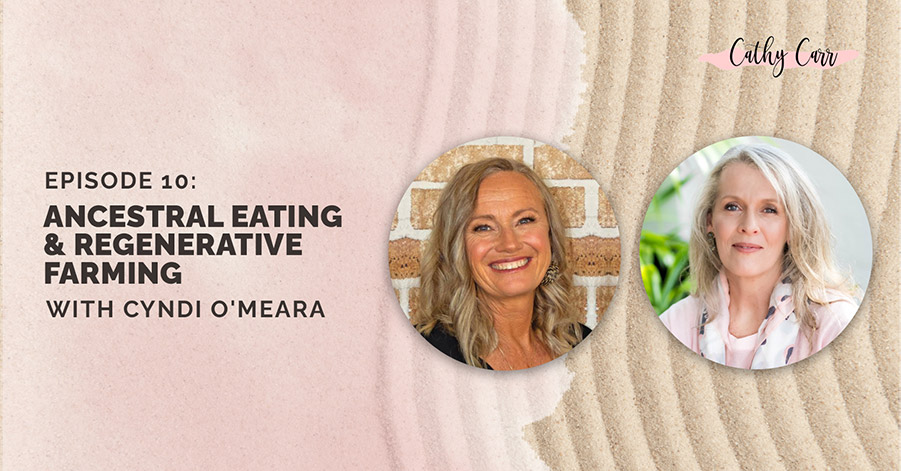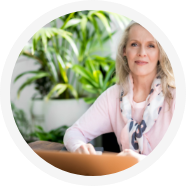How Ancestral Eating and Chemical Toxicity Affect Present Generation
For us to know a person on a deeper level, we have to know her background. Our guest on the Rejuvenated Woman Podcast Cyndi O’Meara talks about why it’s important to look back at the habits of our ancestors, their circumstances, and how it affects the present generation.
Cyndi is an esteemed woman, she is a nutritionist, best-selling author of “Changing Habits, Changing Lives’ and “From Lab to Table,” International and Ted X Speaker. Cyndi is also the founder of Changing Habits – an organisation dedicated to educating and providing the resources needed to live a life full of vitality through consuming real foods.
Her interesting story roots in her family history; her mom grew up on a farm in Iowa while her dad lived in New Zealand. It was written in her maternal grandmother’s diary that Cyndi’s mother was sickly. Her mother was born in 1937 and by 1938, corn and wheat fields started getting sprayed with chemicals.
Around 1945, DDT (dichloro-diphenyl-trichloroethane) was used in farms. With all these exposures to chemicals, Cyndi ponders that there might be a genetic issue that happened to her maternal grandparents that could’ve led to a new genetic disorder to surface.
While on the other side of the world is her dad living in one of the most pristine places in the world – New Zealand. Her paternal grandfather would grow his own food or would eat seaweeds freshly caught from the sea. This started her belief that growing and eating organic, fresh food helps build up our body’s immune system and makes us healthier.
Also part of her background story is the fact that both her mother and sister Lisa passed away at a young age because of cancer. Cyndi believes that she was healthy because her mom cleaned up on her through her sister.
Her mom was exposed to chemicals at a young age and when she was pregnant, she passed on the toxic stuff to her sister. Her family’s background affected her health now and along with the conscious decisions she made, her health has become better even at the age of 61.
Mechanistic and Vitalistic Healthcare
One of the things that her dad learned from studying chiropractic is the difference between mechanistic and vitalistic healthcare. Cyndi uses this principle to better understand what the body is going through.
In Mechanistic Healthcare, whatever illness you experience in your body, you go to the right expert that can help you. Having a heart problem requires a visit with the cardiologist, mental health concerns lead you straight into a psychiatrist, and so on. What happens is that these experts segment the body, when they see symptoms, they’ll give a specific drug to counter that symptom.
The focus here is on the mechanism, they don’t look at what’s going on with the whole body, and they just segment it.
While Vitalistic Healthcare recognizes that individuals have innate intelligence. When we give our bodies the right ingredients, and we take away the interference, we become the healthiest specimen we can possibly be. If we’re going to look at vitalism as a whole, we’ll take into consideration sunshine, sleep, connections, meditations, downtime, food, clean water, and other factors that will help human beings function better.
Even if we’re not giving the right nourishment or ingredients, our bodies are doing their best to stay in homeostasis. However, if we’re not eating properly, our bodies can only do this for a limited time.
The Hunter-Gatherer Principle
Back in the day, our ancestors would use fat cells for survival during the winter months. As Cyndi mentioned, “the fat that you put on in summer becomes your food during winter.” If we’re going to look at anthropological principles, it’s clear that food was our survival.
In an encyclopedic entry of the National Geographic, hunter-gatherer culture is defined as “a type of subsistence lifestyle that relies on hunting and fishing animals and foraging for wild vegetation and other nutrients like honey, for food.”
During this age, our ancestors did not rely on agriculture yet, and they utilize mobility as a survival strategy. They would go through vast areas of land to get the food they need to survive.
This process of hunting food allowed our ancestor’s bodies to naturally undergo a cleanse. Nowadays, with food instantly available, we can eat anything all year round. We no longer give our bodies the privilege of cleansing themselves or using the fat cells we’ve stored for winter.
Instead of losing weight and giving our bodies time to detox, we put more food and these are usually ultra-processed ones.
Benefits of eating the right kind of food
Although not all of us are capable of growing our own food, Cyndi recommends patronizing organically grown fruits and vegetables. All throughout our lives, we’ve been taught that food alone is not enough to give us needed nourishment. However, as Cyndi stated, “if our food is processed and was planted with a lot of chemicals, we may need supplements.”
When Cyndi was experiencing menopause she had all these aches and pain, was gaining weight, her skin was cracking up, there was a tightness in her throat and she had persistent back pain for 18 months.
She decided that she can’t go on life living like that since she was only 50 years old at that time. Cyndi made a conscious decision to eat anything that was a green winter vegetable, eat winter fruits, and continued eating healthy.
During the first three days, she felt like her body was healing, her back pain was gone, and got rid of all the symptoms she was experiencing. By consuming the right kind of food that is free from all the chemicals, Cyndi was able to release all the toxicities that were causing issues in her body.
As a rejuvenated woman, Cyndi knows that food is a big part of educating herself. Gaining all the knowledge from her family background and knowing what works best for her body, Cyndi knows that her health decisions will affect the next generations.
She knows that the value of having good eating and lifestyle habits impacts the kind of life she lives and how she connects with the people around her. It’s her lifelong goal to help other people live their best life by making sure they eat properly and don’t expose themselves to enormous amounts of chemical toxicity.
49:37 – 50:07 Snippet & Quote
“When we get to a specific age group, we do want to make a difference. A lot of us are confused and ask “how can we make a difference? what can I do?” Just say you want to make a difference and look at how you spend your money. The less you spend on chemical farmers and the supplement companies, the more money you spend on over here and supporting the people that are thinking about the planet, then you are making an impact.”



